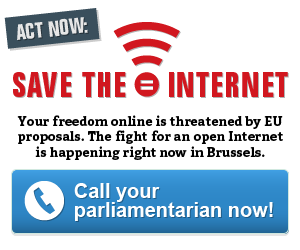Brussels, 12 February 2014 — Today, the “Civil Liberties” (LIBE) committee of the European Parliament adopted its opinion report on the European single market for electronic communications. Key amendments were adopted which, if included in the final text, would guarantee that network neutrality becomes an enforceable rule across all of the European Union. La Quadrature du Net warns against attempts in the Industry committee (ITRE), the lead committee on this dossier, to adopt watered-down amendments that would allow telecommunication operators to distribute specialised services in a way that would radically undermine freedom of communication and innovation on the Internet.
Thanks to amendments tabled by the Greens, S&D and ALDE groups, solid formulations of key articles 2(15)1Article 2(15): “”specialised service” means an electronic communications service or any other service that provides the capability to access specific content, applications or services, or a combination thereof, and whose technical characteristics are controlled from end-to-end or provides the capability to send or receive data to or from a determined number of parties or endpoints; and that is not marketed or widely used as a substitute for internet access service;” and 232Article 23, on “Freedom to provide and avail of open internet access, and reasonable traffic management” and their related recitals, as well as provisions on specialised services and those that ensure enforcement of Net neutrality are now included in the report of the Civil Liberties (LIBE) committee. The EPP rapporteur, Salvador Sedó i Alabart (ES – EPP), himself supported some useful provisions. La Quadrature du Net thanks all Members of the EU Parliament (MEPs) who contributed to this vote.
The text adopted must now become the reference for the remaining of the legislative process, especially for the ITRE committee which will make the final recommendations to the rest of the Parliament on this dossier. However, severe concerns remain regarding the outcome of the vote in the ITRE committee. The lead rapporteur, Mrs. Pilar del Castillo Vera (ES – EPP), is proposing compromise amendments that are scandalously open to abuse by telecommunication operators. What is more, these amendments totally ignore the substance of the better amendments tabled by other ITRE MEPs – including members of her own political group3See: http://edri.org/bad-leadership-kill-open-internet-europe/. Lastly, they are in marked contradiction with the important amendments approved in the LIBE committee today, that would ensure that the regulation protects fundamental rights.
It is worrying that at this stage, even the shadow rapporteurs of political groups that support the good amendments, are extremely timid in their opposition to the rapporteur’s position. Supporting del Castillo’s compromise amendments means ignoring the interests and rights of European citizens and giving a blank check for telecom operators to engage in illegitimate discrimination in Internet communications. All shadow rapporteurs in the ITRE committee – Jens Rohde (DK – ALDE), Catherine Trautmann (FR – S&D), Amelia Andersdotter (SE – Greens/EFA), Giles Chichester (UK – ECR) – must therefore make their position public, so that they can be held accountable for the final ITRE report, which will be voted on 24 February. If they, or other members of their groups, refuse to listen to recommendations by MEPs of their own group in the LIBE committee, and adopt the weak or even anti-Net neutrality compromise amendments, European citizens will hold them accountable, especially in the upcoming European elections.
“European citizens must tell the members of the Industry committee that the only deserving approach is to reject Mrs. Pilar del Castillo Vera’s so-called ”compromise amendments” and that they should adopt the same amendments to articles 2(15) and 23.2 as in the LIBE committee. To preserve the Internet’s contribution to innovation and freedom of communication, European law should clearly ban telecom operators from marketing specialised services that are functionally equivalent to online services delivered on the Internet, thereby bypassing Net neutrality” declares Philippe Aigrain, co-founder of La Quadrature du Net.
“Every vote will count on February 24th, when the Industry committee adopts its final report on the proposed regulation. We call on all of its members to reject the position of the rapporteur Pilar Del Castillo Vera and vote for the key amendments adopted by the Civil Liberties committee, which can ensure that fundamental rights as well as competition and innovation are protected on the open Internet”, concludes Miriam Artino, legal and policy analyst at La Quadrature du Net.
Every European citizen can act to influence the evolution of Net neutrality by calling on their MEPs to establish solid protections of the free Internet. To get on board, please visit the campaign website savetheinternet.eu.
References


